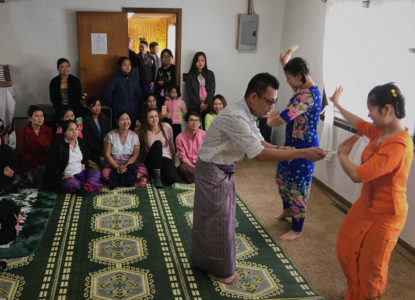
The Thai New Year holiday, Songkran, was celebrated both in Thailand and across the globe from Friday, April 13 to Sunday, April 15. Songkran traditions include performing water-pouring rituals and paying respect to ancestors. Water-pouring in particular has evolved into the main event of the holiday, which is renowned for its water festival.
“[At home] we would just gather in the streets, basically everyone in the city, and fill buckets of ice cold water and just splash them on everyone. … I think [Songkran] became more modernized because traditionally people would just go to their cousin’s house and sprinkle them with water and say, ‘Happy new year,’ but it’s become this commercialized big thing in cities,” said Charun Upara ’21, a Thai student from the northern city of Chiang Rai.
Nandita Banik ’20 agreed.
“The water fight is the best part of the festival for me. I loved playing with friends as a child, and then observing and taking part in it as an adult. Sometimes the roads in Bangkok would clog up, traffic would not be allowed to pass because there’s a huge area closed off for the water fight. It’s magnificent,” Banik wrote in an email to The S&B.
The Thai students at Grinnell elected not to hold a Songkran celebration on campus this year. There are only three Thai students currently enrolled at Grinnell, a total which lacks the critical mass that enables other national and cultural groups to host holiday celebrations.
“It’s terribly cold outside (the water might literally freeze) and it’s logistically a complicated process,” Banik wrote. “[Instead] we just wished each other [‘Happy new year’] and wore Thai clothes (if we had them from home) and [planned] on making some Thai food. … It’s just impossible to celebrate in a similar manner [to home celebrations] in Grinnell.”
Banik, who is also Bengali, noted that she previously attempted to host a dinner for the Bengali festival Durga Puja but found the experience exhausting.
“I just cannot bring myself to arrange more things. I think the fun part of festivals is to celebrate it, not do all the administrative work and then celebrate it,” Banik wrote.
Upara noted that the Burmese students at Grinnell celebrate a New Year festival similar to Songkran, called Thingyan, but clarified that “we’re from different countries and back home it’s not the same festival.”
The Burmese community of Iowa gathered over the weekend of April 13 in Marshalltown to celebrate Thingyan. The Burmese student population at Grinnell numbers even fewer than the Thai community, with only two students.
“We’ve recently established friendships with the Burmese refugee population in the Marshalltown area so for this year’s celebrations we actually went to the festivities put together by the Buddhist Temple there. We all had a blast,” wrote Burmese student Zaw Bo ’18 in an email to The S&B.
Fellow Burmese student Paul Chan ’21 wrote in an email to The S&B that the event was attended by 40 to 50 individuals, mainly from Marshalltown and Des Moines, as well as Chan and Bo. The attendees ate a communal meal of “fried chicken, chicken curry, mango salad,and various other curries along with biryani rice,” Chan wrote. Following the meal some attendees performed traditional Burmese dances and Burmese New Year songs.
Upara was inspired by this representation of Southeast Asian culture throughout Iowa.
“Even though we’re such a minority in Iowa [as] Southeast Asian students, the festival is still being celebrated,” Upara said.




























































